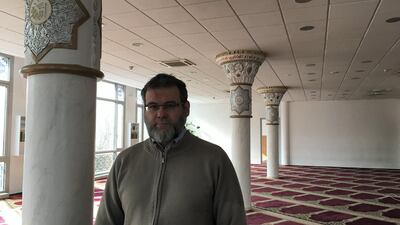Muslims attending prayers at Hungary’s largest mosque have been physically abused, had their cars set alight and been the targets of anti-migration protests. They expect things to get worse.
In the run-up to April national elections, Prime Minister Viktor Orban has ramped up his rhetoric for a campaign set to be dominated by migration - and Hungary’s tiny Muslim population is feeling the backlash.
Critics believe that Mr Orban is playing an anti-migrant card to tap the insecurities of Hungarians after centuries of history marked by invasion and occupation to win a third consecutive term in office. He has become notorious throughout Europe – and feted by the far-right – for building a border fence along the country’s southern borders to keep the migrants out.
“He [Orban] thinks it’s just a game but we’re the ones that are suffering from it,” said Sultan Bolek, a Hungarian historian.
The concerns are no more keenly felt than in this Budapest suburb where some 500 people gather for Friday prayers at the anonymous former offices of an executive toy maker that were converted into a mosque in 2011.
Some of those who turn up expect “pogroms and killings” before the country’s leadership reacts to increasing anti-Muslim sentiment, said Sultan Sulok, the president of the Organisation of Muslims in Hungary.
Mr Orban’s increasingly hostile stance against Muslims followed the 2015 migration crisis when hundreds of thousands of people passed through the central European nation and headed to countries such as Germany, Sweden and the UK.
Mr Orban – who has been premier since 2010 - has previously described the arrival of asylum seekers in Europe as a “poison” with every migrant posing a “public security and terror risk”.
His administration has pushed back against European Union plans for countries to take in a quota of migrants to relieve the pressure on Italy and Greece.
The government’s campaign to oppose the plan led to an uptick of violence against the estimated 40,000 Muslim population, though no official figures have been compiled.
"The political rhetoric was focussed against Muslims and that's when the incidents increased and the beatings happened," Mr Sulok told The National in his office at the Mosque of Muslims in Hungary.
Trouble started soon after it was built in 2011 when four men stoned and torched cars outside during Ramadan prayers.
One man was arrested and claimed he reacted to hearing people inside the mosque say that Hungary was created for the Arabs, said Mr Sulok based on his conversations with police. He said the incident was treated as vandalism and largely ignored by the media.
Since then, demonstrators placed signs on the walls of the mosque with anti-migrant slogans. Neighbours have also complained about noise from the building, despite the mosque being just a few yards from a busy railway line.
_____________
Read more:
Hungary's prime minister ramps up anti-migrant rhetoric in fight for third term
Hungarian PM positions himself as Christian saviour of Europe
Islamophobia has complex roots in history and culture
_____________
In one of the rare incidents reported to police, attackers in 2016 tore off a woman’s hijab and shook her by the hair at a petrol station in the town of Orbottyan about 25 miles northeast of Budapest, according to campaigners.
The attack prompted Mr Bolek, who is also president of the Hungarian Islamic Community, to write to Mr Orban to demand better protection for Muslims. Mr Bolek blamed the "irresponsibility" of politicians and journalists for the increased threats, according to the letter seen by The National. He has not received a reply.
Mr Bolek said he personally collected 15-20 reports of anti-Muslim crimes every year in the absence of official recording of hate crimes by the authorities. “There was the case of one girl who was threatened with a knife and told to get off a tram in Budapest because she was Muslim,” said Mr Bolek.
“The problem is once something big happens - if they burned down a mosque - then there might not be a way back. What’s he going to say then?”
Mr Orban’s closest opponents for next month’s elections is from Jobbik, a far-right group that has raised the prospect of increasing the size of the barrier fence that has defined Mr Orban’s leadership.
The party’s vice-president passed a local law banning burkhas and minarets from his hometown, despite there being no mosque and, according to reporters who visited, only two Muslims living there.
“Only successful and flourishing countries can integrate we are not one of them unfortunately,” Marton Gyongyosi, the party’s foreign policy expert, said in an interview.
Many of Hungary’s Muslims are from Arab countries who travelled to Hungary to study during the 40 years of communism and remaining.
“We have the fewest Muslims in Europe but the biggest hatred and the biggest campaign against them,” said Anna Lénárd, the managing director of Budapest Walkshop who runs a Muslim-themed sightseeing tour.
A survey in 2016 by a thinktank Nezopont Institute found that newly two-thirds of those surveyed believed that Islam was a threat to European societies.
“Most people have never met a Muslim in their life so they don’t know what they are afraid of,” said Ms Lénárd. “To be a Muslim in Hungary was like being a Martian.”


